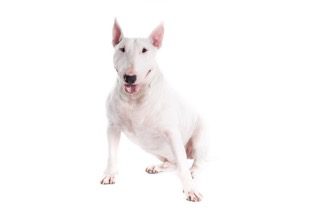
The Bull Terrier is an iconic breed of dog with commendable courage and enough enthusiasm to brighten the lives of their owners. They are a medium-sized, muscular breed, rectangular in shape, with a powerful jaw and progressive gallop. Their short, stiff coat requires minimal grooming and comes in a variety of colors, including brindle, white, red, fawn, and black. The most recognizable feature of the breed is their signature egg-shaped head with triangular eyes and a flat nose. Bull Terriers are playful, loyal, and fun-loving animals. They were initially bred from the extinct English White Terrier and the Bulldog, although some sources suggest the introduction of other breeds such as Dalmatians and Spanish Pointers.
Bull Terriers possess many unique qualities that set them apart from other breeds. Their athleticism and curiosity often lead them to respond positively to exciting activities such as agility. Additionally, their manageable size and short, low-maintenance coats make them excellent choices for apartment dwellers. All in all, Bull Terriers are intelligent and loving dogs with dynamic personalities and boundless heart.
Bull Terriers are an incredibly friendly and gentle breed. They are highly intelligent, playful, and enjoy being around their families. Bull Terriers have a patient and tolerant disposition, making them great family pets, and they often get along well with both children and other pets. Early training and socialization is very important for Bull Terriers, as it helps them become the best they can be. They are a high energy breed, with moderate exercise needs. If given the opportunity, a Bull Terrier can even make a great indoor pet. They do, however, have a tendency to be quite noisy so it’s important to provide suitable activities such as daily walks, runs, and playtime to ensure your Bull Terrier is happy and healthy. Bull Terriers form strong bonds with their owners and will always be devoted and loyal.
The Bull Terrier is a pleasantly active breed, and a healthy diet is essential for its well-being. They require a balanced, nutrient-rich diet to supply them with all the energy and nutrition they need. Aim to feed your Bull Terrier a high-quality dry or wet food that is specially formulated for their size and weight. It’s important to never feed them table scraps or human foods that can be unhealthy for them and possibly cause digestive problems. Regularly check labels for ingredients and portion sizes to ensure you are providing your Bull Terrier with the best nutrition available. Additionally, make sure to provide plenty of fresh, clean water to keep them hydrated, especially on hot days. Responsible ownership or adoption also means scheduling regular check-ups with your veterinarian to keep your Bull Terrier happy and healthy. To learn more about the best care and feeding practices for a Bull Terrier, be sure to check out Way Canina for expert advice and resources. With the right diet and regular check-ups, your Bull Terrier will be a loyal companion to you for many years.
Common health issues and genetic predispositions that can be seen in Bull Terriers include allergies, hip dysplasia, patellar luxation, atopy, von Willebrand’s disease, and heart problems. It is very important that Bull Terriers receive regular veterinary check-ups, vaccinations, and preventive care to help prevent any of these possible issues. It is also important to groom Bull Terriers regularly, which includes brushing, bathing, and ear cleaning.
On average, Bull Terriers typically live between 10-14 years, but some may live even longer. Factors that can influence their longevity include genetics, diet, exercise, and healthcare. Bull Terriers should also be kept on a balanced diet with portion control as obesity can be an issue for this breed. Regular exercise will also be beneficial in preventing any weight gain.
Are you thinking of getting a Bull Terrier or do you already have one? As with any breed, there are many benefits and responsibilities that come with owning a Bull Terrier. Make sure to consider the pros and cons of owning this breed and check out our blog posts and articles on Way Canina to compare different breeds and find more information about dogs’ lifestyle and wellbeing.”